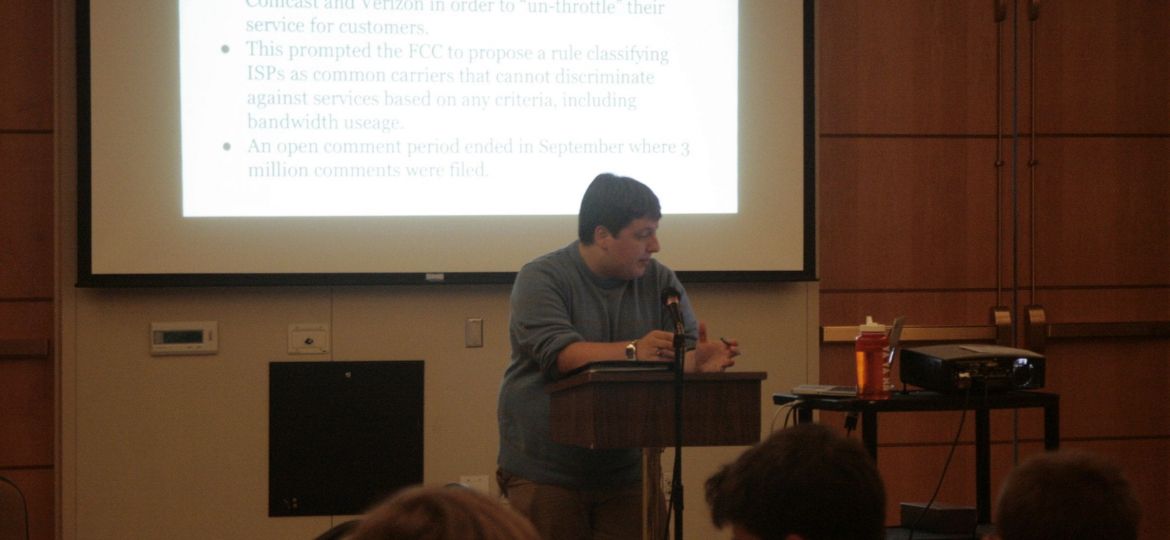
Net neutrality is a complicated political issue, but one that deeply affects most Americans. Any change in net neutrality would disproportionally affect college students, since the Internet is such a vital part of campus life. On Oct. 21, students gathered in the Black Ballroom to hear Nick Stumo-Langer ’15 explain the concept and the potential repercussions of an end to net neutrality.
Stumo-Langer titled his presentation “The End of Net Neutrality: Implications for College Students…and Everyone Else.” He began with a concise explanation of the concept of net neutrality.
Net neutrality is the idea that Internet providers should treat all Internet activity equally. Sites with controversial, subversive or even morally questionable content should load just as quickly as everything else. Conversely, no Web site should be able to pay a premium to their Internet Service Provider ISP, in order to receive faster loading speed than other Web sites.
“You can get BitTorrent the same speed you can get YouTube. You can get the stolaf.edu Web site the same speed as the Communist Party of Nebraska for example,” said Stumo-Langer.
He repeatedly referenced Netflix as a central component of the net neutrality issue. Watching Netflix videos uses extremely large amounts of bandwidth. In fact, St. Olaf’s Internet provider, Comcast, has had to expand the campus bandwidth to accommodate the sheer number of students trying to stream videos online. Comcast, and other ISPs like Verizon, have struggled to keep up with rapidly increasing consumer demand forbandwidth.
Earlier this year, Netflix cut deals with both Comcast and Verizon to increase its connection speed. Netflix was forced to do this because its connection speed had been declining steadily as its popularity increased. ISPs would like to make this standard procedure, effectively ending net neutrality.
“The ISPs argue that [bandwidth demand] has cut into their profit and they have to pass the cost on to someone because they say that in the short term they’re losing money on this. So they’re either going to charge the content creators like Netflix, or the consumers – the average person who is buying [Internet service] from them,” said Stumo-Langer.
Stumo-Langer asked the audience to consider the repercussions of this potential shift in Internet data. Rich companies who can pay the premium, such as Netflix, will receive the fastest connection speeds, essentially creating an elite class of Web sites. Any Web site or company unable to pay would lose business. Start-up Web sites would have to deal with plodding connection speeds, making it extremely difficult to attract Web traffic. Stumo-Langer emphasized the broad ramifications of a tiered Internet sysem.
“Comcast will own the media markets in 26 of the 50 states…This will affect half of the country if this goes into effect, and Comcast has been notoriously aggressive in attempting to dismantle net neutrality,” Stumo-Langer said.
He also addressed the social justice aspect of net neutrality. The Internet in its current state allows for freedom of information and encourages entrepreneurship and innovation, but an end to net neutrality could change that.
“What if the ideology of the ISP’s CEO or the board of trustees is directly against certain content?” Stumo-Langer asked.
There is strong opposition to ending net neutrality within the tech community. Google, Facebook, Netflix and Microsoft were among 150 companies that collaborated to send a letter to the FCC, advocating for the continuation of net neutrality.
Still, large ISPs have tremendous lobbying power in Washington, and the end of net neutrality is a genuine possibility.
Using the last slide of his presentation, titled “A Scary Dystopic Future,” Stumo-Langer addressed the worst-case scenario if net neutrality truly ends.
“Educational access to certain viewpoints and ideologies will not exist,” said Stumo-Langer. “It would lead to a homogeneity of information on the Internet and turn the Internet into a tool of ideological persuasion by those with the most money calling the shots.”
Stumo-Langer acknowledged that this worst-case scenario was certainly far-fetched. Still, the end of net neutrality is a crucial issue in the current digital age and merits close consideration.
bowlin@stolaf.edu
Photo Credit: MADISON VANG/MANITOU MESSENGER

